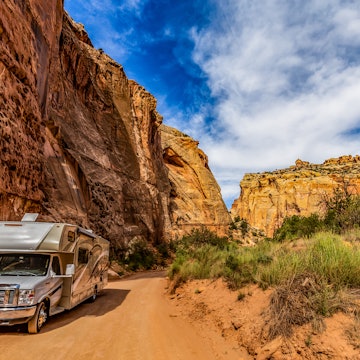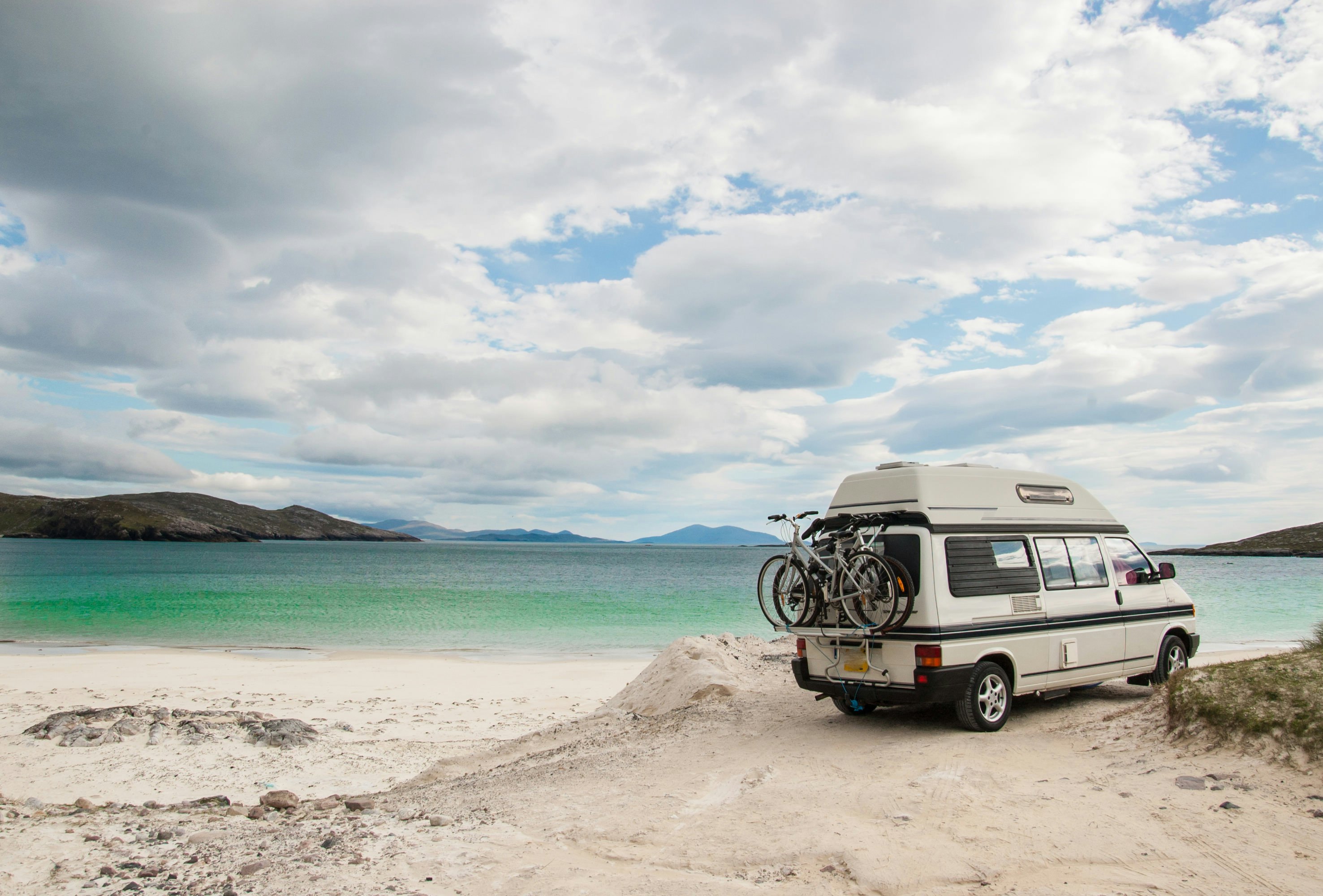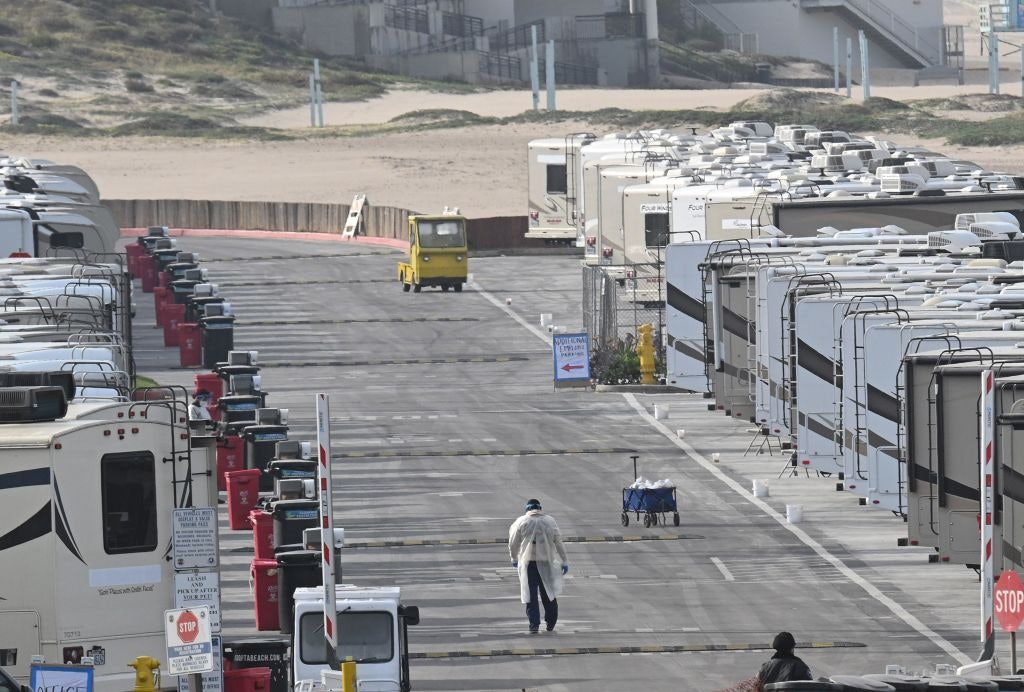

Travelers interested in social-distancing will be turning to RVs for upcoming local and regional road trips © littlehenrabi / Shutterstock
As states in the U.S. lift stay-at-home orders, many travelers are setting their sights on summer vacations. However, as they navigate the lingering risks of COVID-19, vacationers are seeking alternatives to plane travel and hotel stays. Some are finding one in RVing.
Recreational vehicle rental marketplace RVshare reported a 1000 percent rise in bookings from April to mid-May. Additionally, a new study from public opinion researchers Ipsos found that 20 percent of U.S. respondents are more interested in recreational vehicles for travel in the aftermath of the novel coronavirus.
“RVs provide an opportunity for people to continue to enjoy vacations with their families while still adhering to social distancing, which will likely be around in some form for the foreseeable future,” says Monika Geraci, RV Industry Association spokeswoman.

How campgrounds are preparing for RVers to return
Most respondents in RVshare’s survey, 93 percent, wanted to avoid crowded places, and many, 65 percent, said they wanted to be in or around nature. RVs are primed for this type of travel, with many state and national parks offering RV campgrounds. Connecting those destinations has the makings of an epic road trip – or even a broader lifestyle shift.
Barbara Krumm, director of marketing and PR for Ocean Lakes Family Campground, says the campground hasn’t necessarily seen an increase in bookings yet — the property is set in the vacation haven of Myrtle Beach, South Carolina and is usually booked solid. However, she’s seen an increase in interest in camping that she hasn’t witnessed since the months after 9/11.
“It’s been interesting to see the resurgence of interest," says Krumm. "People are wanting to reunite with family and friends, and camping is perceived as a safe travel option."
The massive campground, with 859 campsites and 2,569 annual lease sites on 310 oceanfront acres, has been hustling to add signage to remind people to remain socially distant even as it fills up. Since its May 1 reopening, the staff has added reminders not to congregate, markers to organize queuing, and donned stickers to remind visitors to “Keep Calm and Keep Distance.” They’ve also pointed people to their contact-free, express check-in option to keep interactions limited — just what many travelers new to RVing are craving.

Why travelers are turning to RVs post-pandemic
“2020 will be the year of RV travel,” prophesies Julie Bennett, who, along with her husband Marc, are among the more than one million full-time RVers in the U.S., according to RVillage.com. The couple left their Colorado townhome with dog Coda in 2014 and haven’t looked back.
“An RV is hands down the best way to stay safe and healthy while you travel, as you have total control over your environment. An RV is your own personal self-isolation unit or quarantine machine,” Julie says.
The Bennetts aren't the only ones to take that view. Veronica Ibañes has been a full-time RVer with her husband, Denny Winkowski, since November 2013, though they recently upgraded and downsized to a 19-foot Roadtrek van. She blogs about their travels at RVOutlawz, and says their lifestyle is suited for the ever-changing COVID-19 situation.
“We don’t have a need to use restrooms or stop at restaurants, and we do our shopping online (delivered to campgrounds) and do grocery pickups without going inside,” says Ibañes. All these qualities are a boon for those who want to travel and manage the risks of the virus.

Families and digital nomads are trying RVs now
Long considered the domain of retirees, RVing is growing popular now among younger families, who can pack all their members into one cozy vehicle. Lauren Grijalva, of The Wandrepreneurs.com, who’s a full-time RVer with her husband, Aaron, and two children, Casen, 9, and Calista, 7, advises flexibility, especially when traveling with children.
“Expect things to go wrong. Just roll with it!” she says. “RVing is an amazing way to visit the most beautiful parts of the world. It’s so nice to have all the conveniences of home right with you everywhere you go.”
Many full-time RVers, whether they have families or not, maintain their full-time jobs by working remotely from the road, including Ibañes, Winkowski and the Bennetts. As more and more companies shift to remote work during and after the pandemic, the number of professionals who become digital nomads may increase, too.
As Marc Bennett observes, “With so many companies enabling their employees to work remotely, it’s easier than ever to travel in an RV. You can explore the country while you work, and even road school your kids.”
Tips for first-time RVers
For first-time RV vacationers, renting one of the behemoth vehicles or becoming one of the 11 million Americans who own them brings up numerous logistical questions – from what models require a special license to drive to how to handle the inevitable black water situation. There are so many options to choose from, it can be tricky narrowing down what you want, from tiny "canned ham" trailers and Class B campers to beefy "toy haulers" and Class A motorhomes.
Denny Winkowski suggests easing into the mode of travel, with plenty of advance planning and budgeting. He also recommends renting before buying. And if you’re buying, “get something used and don’t go overboard. It will seem small at first, but you will want to find your balance and learn what you really need.”
In the six years the Bennetts have been crisscrossing North America, they’ve co-authored the book Living the RV Life – Your Ultimate Guide to Life on the Road and taught digital classes on RVing. They advise practicality, like double-checking the vehicle’s tire pressure and adhering to a 55 to 60 mph. speed limit to max out fuel economy.
“Your RV travels will go much smoother when you take your time and prioritize safety, which may sound boring,” Marc says. “But driving an RV is not like driving a car.”

RVing in the Age of COVID-19
The full-capacity campgrounds of Memorial Day weekend were a far cry from just a few weeks earlier, when campgrounds were shuttered and full-time RVers struggled to find open accommodations with hookups. In some parts of the country, including Los Angeles, Louisiana and Georgia, some beachside lots and state parks were temporarily converted to isolation zones in March, using public lands to address a public health crisis.
With differing guidelines and availability in destinations, experts advise travelers to check ahead of their arrivals to ensure their intended campgrounds, state, and national parks are open and there are no restrictions in place that might impact their trips.
“Consider skipping the popular attractions that are more likely to attract big crowds,” Julie says. “Why not make this the year you get off the interstate and drive the scenic highways and byways to see the real America – RV road trip style.”
You might also like:
How vanlifers and RVers are coping with the COVID-19 Pandemic
Test out vanlife with these road-trip ready van rentals
7 tips for remote work from digital nomads around the world













